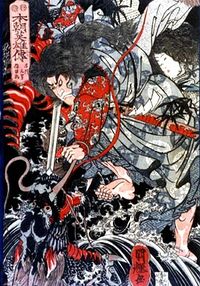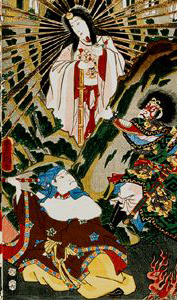Susanoo


Susanoo (須佐之男(スサノオ) romanized as Susano-o, Susa-no-O and Susanowo), also known as Tatehaya Susanoo-no-Mikoto (建速須佐之男命) is the Shinto god of the sea and storms.
Contents |
Myths
In Japanese mythology, Susanoo, the powerful storm of Summer, is the brother of Amaterasu, the goddess of the sun, and of Tsukuyomi, the god of the moon. All three were spawned from Izanagi, when he washed his face clean of the pollutants of Yomi, the underworld. Amaterasu was born when Izanagi washed out his left eye, Tsukuyomi was born from the washing of the right eye, and Susanoo from the washing of the nose.
The oldest sources for Susanoo myths are the ca. 680 AD Kojiki and ca. 720 AD Nihon Shoki. They tell of a long-standing rivalry between Susanoo and his sister. When he was to leave Heaven by orders of Izanagi, he went to bid his sister goodbye. Amaterasu was suspicious, but when Susanoo proposed a challenge to prove his sincerity, she accepted. Each of them took an object of the other's and from it birthed gods and goddesses. Amaterasu birthed three women from Susanoo's sword while he birthed five men from her necklace. Claiming the gods were hers because they were born of her necklace, and the goddesses were his, he decided that he has won the challenge, as his item produced women. The two were content for a time, but Susanoo, the Storm God, became restless and went on a rampage destroying his sister's rice fields, hurled a flayed pony at her loom, and killed one of her attendants in a fit of rage. Amaterasu, who was in fury and grief, hid inside the Ama-no-Iwato ("heavenly rock cave"), thus effectively hiding the sun for a long period of time.
Though she was persuaded to leave the cave, Susanoo was punished by being banished from Heaven. He descended to the province of Izumo, where he met an elderly couple who told him that seven of their eight daughters had been devoured by the eight-headed serpent Yamata no Orochi and it was nearing time for their eighth, Kushinada-hime (櫛名田比売). The Nihon Shoki gives the most detailed account of Susanoo slaying the Yamata no Orochi. Compare the Kojiki version where Chamberlain (1919:71-3) translates Susanoo as "His-Swift-Impetuous-Male-Augustness."
Then [His-Swift-Impetuous-Male-Augustness] descended from Heaven and proceeded to the head-waters of the River Hi, in the province of Izumo. At this time he heard a sound of weeping at the head-waters of the river, and he went in search of the sound. He found there an old man and an old woman. Between them was set a young girl, whom they were caressing and lamenting over. Sosa no wo no Mikoto asked them, saying: "Who are ye and why do ye grieve lament thus?" The answer was: "I am an Earthly Deity, and my name is Ashi-nadzuchi. My wife's name is Te-nadzuchi. This girl is our daughter, and her name is Kushinada-hime. The reason of our weeping is that formerly we had eight children, daughters. But they have been devoured year after year by an eight-forked serpent and now the time approaches for this girl to be devoured. There is no means of escape for her, and therefore do we grieve.” His-Swift-Impetuous-Male-Augustness said: "If that is so, wilt thou give me thy daughter?" He replied, and said: "I will comply with thy behest and give her to thee." Therefore His Swift-Impetuous-Male-Augustness on the spot changed Kushinada-hime into a many-toothed close-comb which he stuck in the august knot of his hair. Then he made Ashi-nadzuchi and Te-nadzuchi to brew eight-fold sake, to make eight cupboards, in each of them to set a tub filled with sake, and so to await the arrival its coming. When the time came, the serpent actually appeared. It had an eight-forked head and an eight-forked tail; its eyes were red, like the winter-cherry; and on its back firs and cypresses were growing. As it crawled it extended over a space of eight hills and eight valleys. Now when it came and found the sake, each head drank up one tub, and it became drunk and fell asleep. Then Sosa no wo no Mikoto drew the ten-span sword which he wore and chopped the serpent into small pieces. When he came to the tail, the edge of his sword was slightly notched, and he therefore split open the tail and examined it. In the inside there was a sword. This is the sword which is called Kusa-nagi no tsurugi. (tr. Aston 1896:1:52-53)
This sword from the dragon's tail, the Ama-no-Murakumo-no-Tsurugi ("Sword of the Gathering Clouds of Heaven") or the Kusanagi-no-Tsurugi ("Grasscutter Sword"), was presented by Susanoo to Amaterasu as a reconciliation gift. According to legends, she bequeathed it to her descendant Ninigi along with the Yata no Kagami mirror and Yasakani no Magatama jewel or orb. This sacred sword, mirror and jewel collectively became the three Imperial Regalia of Japan.
Izumo
While Amaterasu is enshrined at the Honden Shrine or "Grand Shrine", which is at the entrance to the Ise Shrine, Susano'o is enshrined at Kumano Taisha located in Shimane (formerly the Izumo region), where he descended when banished from heaven.
References
- Aston, William George, tr. 1896. Nihongi: Chronicles of Japan from the Earliest Times to A.D. 697. 2 vols. Kegan Paul. 1972 Tuttle reprint.
- Chamberlain, Basil H., tr. 1919. The Kojiki, Records of Ancient Matters. 1981 Tuttle reprint.
External links
- Susanoo, Encyclopedia of Shinto
- Susano-O no Mikoto, Kimberley Winkelmann
- Shinto Creation Stories: Sosa no wo in Izumo, Richard Hooker
|
|||||||||||||||||||||||||||||||||||||||||
